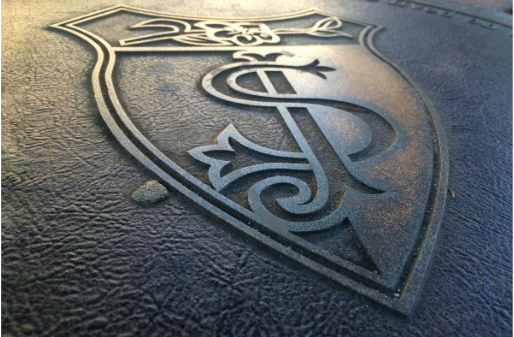Louisiana health officials put coronavirus precautionary plans into action

The St. Joseph’s Academy shield on the private high school’s campus in Baton Rouge on Jan. 31, 2017. Fifteen students from the high school that recently traveled to Italy are not able to return to campus for 14 days after their arrival to the state amid coronavirus concerns.
March 9, 2020
When a group of St. Joseph’s Academy students traveled to Italy during their Mardi Gras break, they expected an educational trip with memories to last a lifetime.
But the 15 students from the all-girls private Catholic high school in Baton Rouge, along with four adult chaperones, learned additional lessons as they navigated a country trying to contain an outbreak of novel coronavirus, COVID-19.
The epicenter for the coronavirus outbreak in Italy is in the north of the country, specifically in Lombardy and Veneto, where the Centers for Disease Control and Prevention currently recommends avoiding nonessential travel to the region, considered a Warning Level three.
However, when the group was in Italy, the travel advisory status from the CDC was Alert Level two, Practice Enhanced Precautions. The status did not upgrade to Level three until Feb. 28.
The St. Joseph’s Academy group did not want to take any chances and visit northern Italy as planned, so they cut their trip short by two days and returned to Louisiana on Feb. 27, according to an email sent to parents by the school on March 2.
After their return to the state, St. Joseph’s Academy consulted with officials, including the Louisiana Department of Health and Office of Public Health, to determine the next steps the group should take to protect themselves and others.
“We have been advised that the likeliness of exposure for our students and chaperones is extremely low. We have also been advised that given the timeline of the travel, these individuals do not present a risk to themselves or others,” said school officials in the email.
At the time of the group’s return to Louisiana, the CDC did not have any recommendations for people who traveled to Italy to self-isolate or quarantine when the returned to the United States, according to the email to parents.
Ultimately, St. Joseph’s Academy officials decided to not let students and faculty who traveled to Italy return to school for 14 days following their arrival to Louisiana. While at home, students would be able to keep up with classes and assignments virtually.
“We are sensitive to concerns regarding the possibility, however miniscule, of exposure. We also recognize that uncertainty surrounds the disease. As a result and out of an abundance of caution, SJA has opted to go a step beyond what the CDC and Louisiana Department of Health and Office of Public Health presently recommend,” explained St. Joseph’s Academy officials in the email.
Dr. Frank Welch, medical director for emergency preparedness at the Louisiana Department of Health, says that the group should continue to follow precautions while doing schoolwork from home.
“But what we want them to do is monitor for signs of illness, meaning take their temperature a couple times a day, make sure they are practicing those common-sense practices — covering their coughs, washing their hands, making sure their environment is clean and all that kind of stuff,” said Welch, “If they do develop signs of illness, like fever and cough, they need to call their doctor immediately because those are the kind of people we like to find out — if they do have it, or not — to make sure we are protecting not only them, but their families and their school as well.”
Welch explained that guidance from the CDC and the federal government is rapidly changing as the coronavirus spreads to more countries.
“Only people coming back from China and Iran are being monitored. People coming back from South Korea and Italy are not, and that’s part of the confusion in the guidance that we are getting,” said Welch, “People coming back from Italy and South Korea are given information about monitoring themselves.”
People who return to Louisiana from China are reporting to the Louisiana Health Department every day for two weeks, in case of any signs of fever or coronavirus symptoms, according to Welch.
As information from the federal government and the CDC continues to change and develop, the Louisiana Department of Health began preparations across the state, from health alerts to hospitals and doctors and guidance for the healthcare community to follow in preparation for a case of the coronavirus in the state.
The Louisiana Department of Health has also developed guidance documents for K-12 schools, daycares, universities and colleges, law enforcement, and first responders.
A large focus of preparation and guidance has been for nursing homes across the state.
“Most people who get COVID-19 are just going to get a cold, but the people who are really at risk of getting serious illness are the elderly or they have other illnesses,” said Welch.
Welch recommends all Louisiana residents to focus on following “common-sense” rules in preparation for a potential outbreak in the state. These rules include washing hands with soap and water for at least 20 seconds, covering coughs and sneezes, and staying away from sick people. Welch says anyone who becomes sick should stay at home and call their doctor.
“Those are really the best common-sense tips to not only prevent yourself from getting COVID-19 or spreading COVID-19 if you have it, but also influenza as well,” Welch said, “We are in the midst of a terrible flu season right now, it has totally been overshadowed by COVID-19, but those common-sense tips will protect you from the flu as well.”







